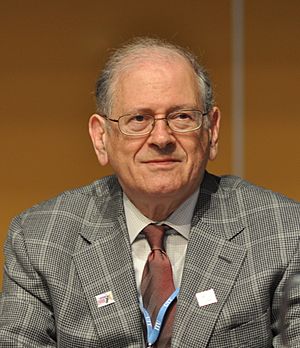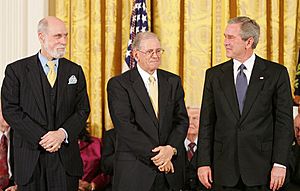Robert Kahn (computer scientist) facts for kids
Quick facts for kids
Robert Kahn
|
|
|---|---|

Kahn in Geneva, May 2013
|
|
| Born |
Robert Elliot Kahn
December 23, 1938 Brooklyn, New York, U.S.
|
| Education | City College of New York (BS) Princeton University (MA, PhD) |
| Known for | TCP/IP |
| Spouse(s) | Patrice Ann Lyons |
| Awards |
|
| Scientific career | |
| Fields | Telecommunications, networking |
| Institutions | Bell Labs MIT BBN DARPA Corporation for National Research Initiatives |
| Thesis | Some problems in the sampling and modulation of signals (1964) |
| Doctoral advisor | Bede Liu |
Robert Elliot Kahn, born on December 23, 1938, is an American electrical engineer. He is famous for helping create the basic rules, called protocols, that make the internet work. These are the Transmission Control Protocol (TCP) and the Internet Protocol (IP). He developed them with Vint Cerf.
For this important work, he and Vint Cerf received the Turing Award in 2004. This award is like the "Nobel Prize" for computer science.
Contents
Early Life and Education
Robert Elliot Kahn was born in December 1938 in New York. His parents were Beatrice Pauline and Lawrence Kahn. His family was Ashkenazi Jewish.
He earned a bachelor's degree in electrical engineering from the City College of New York in 1960. After that, he went to Princeton University. There, he earned his master's degree in 1962 and his Ph.D. in 1964, both in electrical engineering.
Career Highlights
Kahn first worked at Bolt Beranek and Newman Inc.. He was the main designer for the ARPANET. This was an early computer network that led to the internet.
In 1972, he showed how the ARPANET worked. He connected 20 different computers at a big conference. This event helped people see that packet switching was a real and useful technology. Packet switching is how data is broken into small pieces, called packets, and sent across a network.
Later in 1972, Kahn joined DARPA. This is a U.S. government agency that works on new technologies. At DARPA, he helped create the TCP/IP protocols. These rules allowed different computer networks to connect and talk to each other.
He also started the United States government's "Strategic Computing Initiative." This was a huge research program for computers.
After 13 years at DARPA, Kahn left to start the Corporation for National Research Initiatives (CNRI) in 1986. He is still its chairman, CEO, and president.
How the Internet Was Born
While working on a satellite network project called SATNET, Kahn came up with ideas for what became Transmission Control Protocol (TCP). TCP was meant to replace an older network rule called NCP.
TCP was key to creating the internet. It allowed computers and networks worldwide to communicate. This worked no matter what kind of hardware or software they used. To make this happen, TCP was designed with several important features:
- Smaller parts of the network could talk to each other. They used special computers called gateways (now called routers) that only forwarded data packets.
- No single part of the network could fail and stop the whole system. Also, no single part could control the entire network.
- Each piece of information sent was given a sequence number. This made sure they arrived in the correct order. It also helped detect if any pieces were lost.
- When a computer sent information, it knew it was received. The other computer would send back a special message called an acknowledgement (ACK).
- If information was lost, it would be sent again. This happened if the sending computer didn't get an acknowledgement within a certain time.
- Every piece of information included a checksum. This was a special code calculated by the sender. The receiver checked it to make sure the information wasn't damaged.
Vint Cerf joined Kahn on this project in 1973. Together, they finished an early version of TCP. Later, they split the protocol into two parts:
- TCP handled how computers talked to each other.
- Internet Protocol (IP) handled how different networks connected.
These two parts, TCP/IP, are the foundation of the modern internet. In 1992, Kahn and Cerf also co-founded the Internet Society. This group helps guide internet standards, education, and policies.
Awards and Recognition
Robert Kahn has received many awards for his work.
- In 1981, he became an IEEE fellow for his work in packet switching technology.
- He was elected to the National Academy of Engineering in 1987.
- He shared the 2004 Turing Award with Vint Cerf. This was for their "pioneering work on internetworking" and for their leadership in networking.
- In 2005, he received the Presidential Medal of Freedom. This is one of the highest civilian awards in the United States.
- He was inducted into the National Inventors Hall of Fame in 2006.
- In 2008, he received the Japan Prize with Vinton Cerf.
- In 2012, Kahn was inducted into the Internet Hall of Fame.
- In 2013, he received the first Queen Elizabeth Prize for Engineering.
- In 2024, Kahn received the IEEE Medal of Honor. This was for his leadership in packet communication and the internet's foundations.
Honorary Degrees
Kahn has received honorary degrees from many universities. These include Princeton University, University of Pavia, and ETH Zurich.
See also
 In Spanish: Robert Kahn para niños
In Spanish: Robert Kahn para niños
 | Misty Copeland |
 | Raven Wilkinson |
 | Debra Austin |
 | Aesha Ash |


